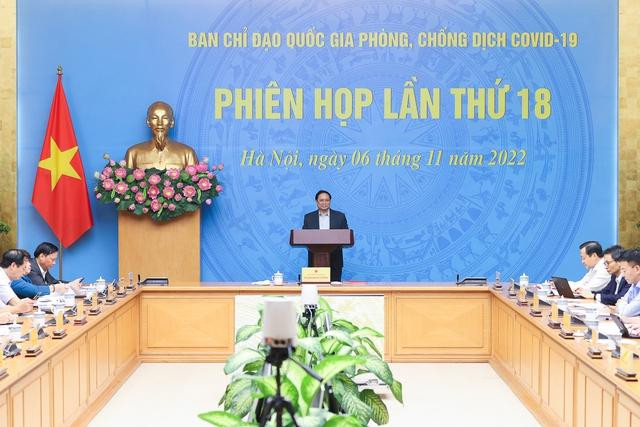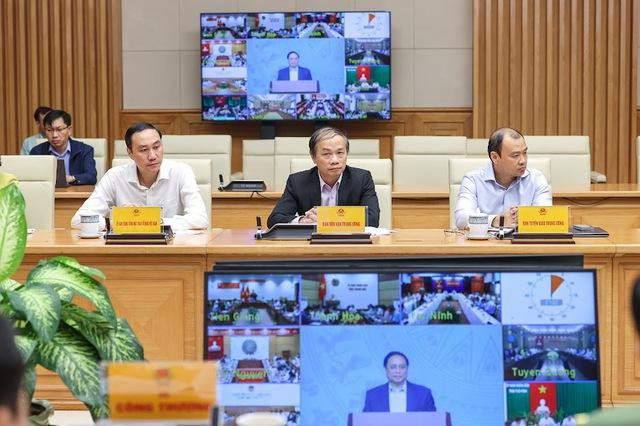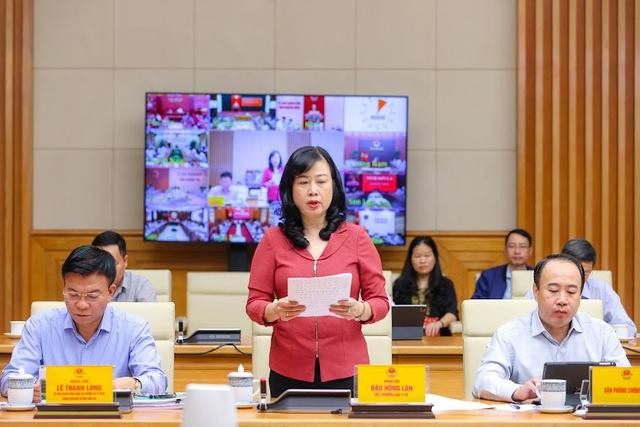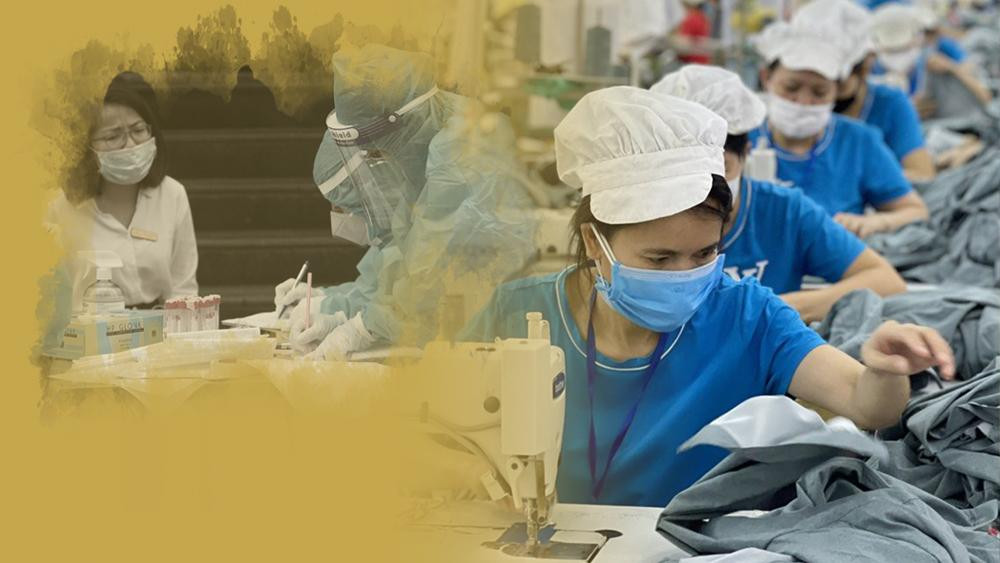The world is still in a pandemic, it is not possible to determine the elimination of COVID-19
According to the report at the morning meeting of the National Steering Committee for COVID-19 Prevention and Control on November 6, the latest assessment of the Emergency Committee (EC) on the International Health Regulations (IHR) said that the world is still in a state of COVID-19 pandemic. Most studies have concluded that at this time it is not appropriate to mention community immunity to the COVID-19 epidemic, and it is not possible to determine the eradication or elimination of the COVID-19 epidemic. Vaccines are still the most important strategy in the new normal period.
 |
Prime Minister Pham Minh Chinh, Head of the National Steering Committee for COVID-19 Prevention and Control, chairs the 18th meeting of the Steering Committee. Photo: VGP/Nhat Bac |
On the morning of November 6, Prime Minister Pham Minh Chinh, Head of the National Steering Committee for COVID-19 Prevention and Control (Steering Committee), chaired the 18th meeting of the Steering Committee online with 63 provinces and centrally-run cities.
Attending the meeting at the Government Headquarters were members of the Steering Committee: Deputy Prime Ministers Le Minh Khai, Vu Duc Dam, Le Van Thanh; leaders of central departments, ministries, branches and agencies.
Local bridges have members of the Steering Committee for COVID-19 Prevention and Control of provinces and cities, including Secretaries of Provincial and Municipal Party Committees, Chairmen of People's Committees of centrally-run provinces and cities, and leaders of relevant departments and branches.
Speaking at the opening of the meeting, Prime Minister Pham Minh Chinh emphasized in Conclusion 42, dated October 20, 2022, that the Central Committee still determined to prevent and control the COVID-19 epidemic better to create conditions to carry out political tasks and socio-economic development in 2022, 2023 and the following years. Meanwhile, WHO warned that COVID-19 is still in the pandemic stage. In the country, along with the COVID-19 epidemic, a number of other epidemics such as dengue fever and monkeypox have appeared, so the Steering Committee organized the 18th meeting to assess the situation and work of preventing and controlling the COVID-19 epidemic as well as other emerging epidemics.
The Prime Minister asked delegates to focus on evaluating the work of vaccinating people against COVID-19, in which, along with evaluating the results and effectiveness, it is necessary to clearly identify the limitations, weaknesses and responsibilities of organizations and individuals in this issue; discuss how to overcome the shortage of drugs, equipment and medical supplies, especially pointing out difficulties and obstacles to find solutions, "if anyone does not dare to do it, then ask for leave, stand aside"; evaluate the transfer of human resources in the health sector, specify the number of transferred human resources and the number of new recruits, not just the number of people asking for leave... "It is necessary to clearly indicate the role and responsibility of the Steering Committee for COVID-19 prevention and control at all levels; the role and responsibility of relevant ministries, branches and agencies in the above issues", the Prime Minister emphasized.
 |
Delegates attend the meeting at the Government Headquarters. Photo: VGP/Nhat Bac |
According to the Steering Committee's report, as of October 30, 2022, the world has recorded more than 635.3 million COVID-19 cases and more than 6.59 million deaths. In the past 7 days, 16 countries and territories have recorded a high number of deaths, from 100 cases or more, showing that the COVID-19 pandemic is still complicated and unpredictable.
In our country, to date, over 11.5 million cases have been recorded, more than 10.6 million people have recovered (accounting for 92.2%) and more than 43,000 deaths (accounting for 0.38%). In October, the whole country recorded 24,283 new cases, down 64.8% compared to the previous month; 15 deaths, down 16 cases. Notably, the country has also recorded cases of infection with sub-variants BA.4, BA.5, BA.2.74 in the community, the latest being sub-variant BA.2.75.
Regarding vaccination, as of November 2, 2022, the whole country has deployed more than 262 million doses of COVID-19 vaccine. Of which, the rate of first and second injections for people aged 12 and over reached nearly 100%; the rate of third and fourth injections for people aged 18 and over reached 78.9% and 83.2%; the rate of third injection for people aged 12 to under 18 was 63.8%; the rate of first and second injections for children aged 5 to under 12 reached 88.9% and 62.1%.
In October 2022 alone, the whole country injected 1.9 million doses of vaccine, an average of 60,000 doses per day, a decrease compared to the average of September 2022 (100,000 doses/day), August 2022 (350,000 doses/day) and July 2022 (430,000 doses/day).
The Steering Committee assessed that the COVID-19 epidemic situation is still complicated, unstable and difficult to predict; the immune response due to infection or vaccination gradually decreases over time. In addition, the SAR-CoV-2 virus is constantly changing with new strains and sub-variants that have the potential to spread quickly, avoid immunity, reduce treatment effectiveness, and cannot rule out the risk of worsening and death again.
At its 13th meeting (October 13, 2022), the Emergency Committee (EC) on the International Health Regulations (IHR) related to COVID-19 assessed that "the world is still in a COVID-19 pandemic situation and countries must continue to strengthen surveillance systems and expand treatment and vaccine capacity for high-risk groups; at the same time, continue to update national preparedness and response plans for the COVID-19 pandemic".
Previously, in July 2022, the World Health Organization (WHO) assessed that the world was still in the pandemic stage and warned that new variants of the SARS-CoV-2 virus could complicate the COVID-19 epidemic, increasing the risk of resurgence, and recommended maintaining response measures, especially vaccination. WHO still recommends that countries seize the opportunity, continue efforts, maintain epidemic prevention and control measures, especially ensuring vaccination targets to achieve the goal of disease control.
WHO emphasized that COVID-19 vaccination for 100% of high-risk subjects (both primary and booster doses), then expanding vaccination to lower-priority subjects to minimize severe illness and death due to COVID-19 is still the most important strategy in the new normal period.
 |
Minister of Health Dao Hong Lan stated that in order to effectively prevent and control the COVID-19 epidemic, protect people's health and lives, and create conditions for socio-economic recovery and development, it is necessary to continue to closely monitor, evaluate, analyze the situation, proactively develop scenarios and response plans and deploy them to respond to all situations - Photo: VGP/Nhat Bac |
According to Minister of Health Dao Hong Lan, Vietnam is conducting a number of studies to evaluate the protective effectiveness and immune response of COVID-19 vaccines. There are currently no official results, however, the results of international studies on the protective effectiveness after COVID-19 vaccination can be used as reference and to implement epidemic prevention activities that are appropriate to the actual situation in Vietnam.
Accordingly, the vaccine's effectiveness after the third injection in preventing severe complications, hospitalization and death reached about 86% (in the first month). This effectiveness gradually decreased after 6 months and decreased sharply from the 4th to the 6th month (protective effectiveness in the 6th month was about 70%). After the fourth injection, the ability to prevent severe complications, hospitalization and death increased by about 9% to 28% compared to the third injection.
Most studies also conclude that at this time it is not appropriate to mention community immunity to the COVID-19 epidemic, and it is not possible to determine the eradication or elimination of the COVID-19 epidemic.
Therefore, Minister Dao Hong Lan stated that in order to effectively prevent and combat the COVID-19 epidemic, protect people's health and lives, and create conditions for socio-economic recovery and development, it is necessary to continue to closely monitor, evaluate, analyze the situation, proactively develop scenarios and response plans and implement them to respond to all possible situations of the epidemic; at the same time, promptly update and supplement professional instructions and support localities in preventing and combating the COVID-19 epidemic.
In addition, continue to accelerate the progress of COVID-19 vaccination; be ready and organize well the work of admission and treatment; ensure drugs, supplies, medical equipment, and human resources for COVID-19 prevention and control; urge and guide the implementation of research and production of vaccines, biological products, drugs, supplies, medical equipment, etc.

Human resources after Covid-19
12/09/2022


